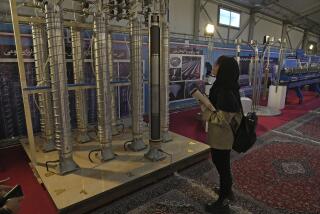Scientist Claimed Nuclear Equipment Was Old, Official Says
- Share via
ISLAMABAD, Pakistan — An official involved in the investigation of Abdul Qadeer Khan said Monday that the Pakistani nuclear scientist has claimed that the equipment he sold to Iran and North Korea to enrich uranium was outdated.
Khan was pardoned last week by President Pervez Musharraf after confessing to illegally passing nuclear secrets abroad. But the nation’s Foreign Ministry said Monday that the pardon was conditional and that the man who led the secret effort to develop Pakistan’s nuclear bomb must cooperate with investigators as new questions arise.
“The pardon is specific to charges made so far,” ministry spokesman Masood Khan said. “This is certainly not a blanket pardon for Dr. A. Q. Khan. The investigations have not come to a closure.”
Khan’s claim appeared to be an attempt to play down the value of the technology he spread. That assertion, together with the announcement that Khan could still face punishment, may represent an effort by Pakistan to mollify critics in the U.S. and elsewhere who are angry about Khan’s activities and the pardon.
However, international investigators said that even sharing outdated designs would substantially promote the spread of nuclear weapons. Inspectors with the U.N.’s International Atomic Energy Agency, for instance, have found that Iran made significant improvements on Pakistani-designed equipment.
According to Pakistani officials involved in the investigation, Khan said in his signed confession that he supplied old and discarded centrifuges and other uranium-enrichment equipment to North Korea and Iran.
One official, who spoke on condition that he not be named, identified the equipment as P-I and P-II centrifuges, machines used to enrich uranium to fuel nuclear reactors and warheads. The P-I is thought to have been made using blueprints Khan is suspected of stealing while he was working at a uranium-enrichment plant in the Netherlands in the 1970s.
The official said Khan had transferred P-I and P-II machines to North Korea along with drawings, sketches, technical data and depleted uranium hexafluoride gas -- the feedstock for gas centrifuges and a crucial, difficult-to-obtain element.
Khan said he supplied equipment such as old P-I machines with drawings to Iran under pressure from the late Gen. Imtiaz when the general was defense advisor to Prime Minister Benazir Bhutto from December 1988 to August 1990, officials claimed.
Khan also said he met Iranian scientists in the Pakistani city of Karachi at the request of another close Bhutto aide, identified as Dr. Niazi. He had meetings with Libyans in Istanbul, Turkey, in 1990, the officials said.
Bhutto, who lives in exile in London and Dubai, United Arab Emirates, said in an e-mail interview last week that she never had direct knowledge that Pakistanis were involved in nuclear proliferation while she was in power. Now she believes the military is trying to hide its complicity, she added.
One official said the nuclear leaks started in the late 1980s. There was a lack of strict command and control over Pakistan’s nuclear program for 20 years, the official said, until after Musharraf seized power in a 1999 coup.
The contention that Pakistan’s military and intelligence services were unaware of Khan’s activities contradicts assurances that Musharraf and senior Pakistani military leaders gave to U.S. officials.
“Musharraf and people before him constantly assured us that this was something that the military had a firm grip on,” a former U.S. intelligence official said Monday in a phone interview from Washington.
More than a dozen scientists, security staff at Pakistan’s main nuclear research laboratory and military personnel have been detained for “debriefing” in recent months. The Foreign Ministry said Monday that seven scientists and retired military personnel in custody would not be allowed to resume their work at the Khan Research Laboratories.
Although relatives of the detained scientists have insisted that military intelligence officers strictly monitored employees of the laboratory and their families, the official interviewed Monday said it was “a one-man show” under an officer he identified only as Brig. Tajwar. The military’s powerful Inter-Services Intelligence agency -- which is widely believed to be present in virtually every corner of Pakistani society -- was shut out of Khan’s nuclear facility, the official said.
Khan’s direct shipments of bomb-making equipment went through a black market network with the assistance of two Sri Lankans, identified as Tahir and Farooq. Dubai became the shipment hub and the place where clandestine meetings took place and deals were struck, the official said.
North Korea -- which has denied having a uranium-enrichment program -- placed orders for P-I centrifuge components from 1997 to 1999, and Khan and his associates provided direct technical assistance to that country from 1998 to 2000, said an official involved in the probe.
Izaz Jaffery, the owner of an Islamabad nightclub called Hot Shot, has been arrested on suspicion of being an emissary between Khan and Iran, the source said.
*
Times staff writer Douglas Frantz in Istanbul contributed to this report.
More to Read
Sign up for Essential California
The most important California stories and recommendations in your inbox every morning.
You may occasionally receive promotional content from the Los Angeles Times.













